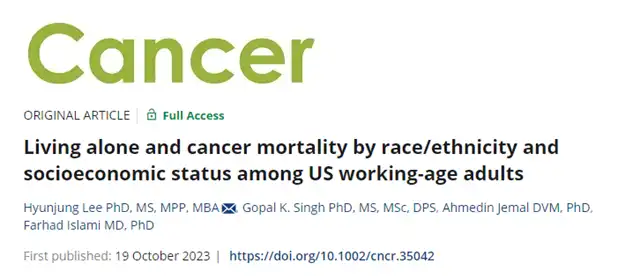American Cancer Society: Living Alone Linked to a 32% Increase in Cancer Risk
- Normal Liver Cells Found to Promote Cancer Metastasis to the Liver
- Nearly 80% Complete Remission: Breakthrough in ADC Anti-Tumor Treatment
- Vaccination Against Common Diseases May Prevent Dementia!
- New Alzheimer’s Disease (AD) Diagnosis and Staging Criteria
- Breakthrough in Alzheimer’s Disease: New Nasal Spray Halts Cognitive Decline by Targeting Toxic Protein
- Can the Tap Water at the Paris Olympics be Drunk Directly?
American Cancer Society: Living Alone Linked to a 32% Increase in Cancer Risk
- Should China be held legally responsible for the US’s $18 trillion COVID losses?
- CT Radiation Exposure Linked to Blood Cancer in Children and Adolescents
- FDA has mandated a top-level black box warning for all marketed CAR-T therapies
- Can people with high blood pressure eat peanuts?
- What is the difference between dopamine and dobutamine?
- How long can the patient live after heart stent surgery?
American Cancer Society: Living Alone Linked to a 32% Increase in Cancer Risk
Solitary Living Raises Cancer Mortality Risk, Especially Among Men.
A recent study by the American Cancer Society reveals a 32% increase in cancer risk for individuals living alone.
Published in the journal “Cancer,” the research explores the correlation between solitary living and cancer mortality among working-age adults in the United States.

Living alone is widely recognized as having adverse effects on both physical and mental health. Individuals who reside alone are more prone to unhealthy lifestyle habits, such as poor diet and lack of exercise, which may contribute to an increased risk of psychological issues like loneliness, depression, and anxiety. Co-habitation with others is believed to significantly reduce the likelihood of experiencing isolation.
The study, based on data from the National Health Interview Survey (NHIS) cohort with 473,648 participants aged 18-64, analyzed the relationship between living alone and cancer mortality. Over a 22-year follow-up period, 24% of participants lived alone, with a total of 8,729 recorded cancer-related deaths, including 2,905 individuals living alone and 5,824 living with others.
The findings indicate that living alone is associated with a 32% higher risk of cancer mortality compared to those living with others. Specifically, the cancer mortality risk for solitary men is 38%, while for solitary women, it is 30%.
Further analysis by age reveals variations in cancer mortality risk. Between ages 18-44, solitary adults face a 10% higher risk of cancer mortality, rising to 31% for those aged 45-54, and peaking at 38% for individuals aged 55-64.
Gender differences are also notable, with solitary men facing a 38% higher risk of cancer mortality compared to solitary women at 30%.
The researchers emphasize the importance of addressing the issue of solitary living and advocate for intervention measures to mitigate the adverse effects of social isolation. Regular comprehensive screenings are recommended for individuals living alone.
In conclusion, this nationwide representative study underscores the heightened cancer mortality risk among solitary adults and emphasizes the significance of addressing solitary living. Further research is encouraged to identify potential mechanisms underlying this association.
American Cancer Society: Living Alone Linked to a 32% Increase in Cancer Risk
(source:internet, reference only)
Disclaimer of medicaltrend.org
Important Note: The information provided is for informational purposes only and should not be considered as medical advice.



